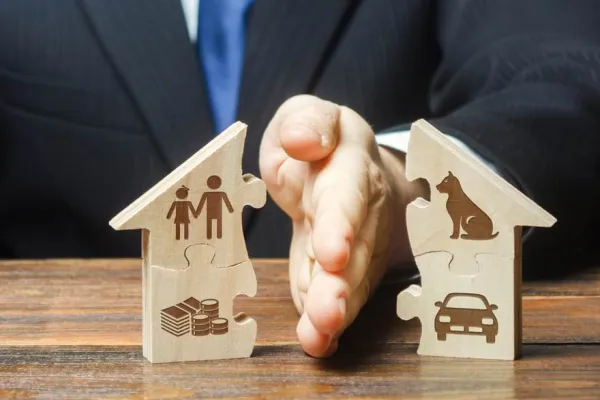Your house valuation needs to be completed accurately. It is a crucial part of selling your property for a fair price.
But if you haven’t sold your house in a long time (or ever), you might be confused about the steps involved.
In this blog, we’ll explore what a house valuation is and how it works. Keep reading for all the critical information.
What is a house valuation?
A house valuation is when someone determines the value of your property.
It usually happens when a homeowner wants to sell their property. It gives you a guideline on how much to list it for on the open market.
Property owners can get house valuations from a number of sources, including:
- Estate agents (including online estate agents)
- Property surveyors
- Property auction houses
- Cash house buyers.
This person will consider lots of factors when deciding on your valuation. These include:
- Current market conditions
- Square footage
- Quantity and types of rooms
- Your house’s condition
- Location
- Interior and exterior features.
The full list of details to consider is much longer than this. An expert will use all their knowledge to give you an accurate guideline.
How long do house valuations take?
A house valuation usually takes between 30 minutes to 1 hour to complete.
The importance of accuracy
It depends on the size of your property and how many unique features there are. Once you receive their opinion, it is up to you to follow it accurately.
Remember that you can only find buyers if you overinflate the value.
You may also struggle to get a bank to agree on the amount they should lend you.
Why is a house valuation important?
A house valuation is essential for the success of your sale.
If you price your property correctly and market conditions are stable, you should receive plenty of viewings and offers.
An accurate valuation increases your negotiating power, which in turn can increase your final sale price.
Likewise, if your house valuation is inaccurate, you may struggle to find viewers and your negotiating power weakens.
This often translates into a lower final selling price. It also delays the time it takes to complete a sale.
Get multiple house valuations
Lots of homeowners arrange several different valuations for the reasons mentioned above. It gives them a broader perspective.
After all, some estate agents exaggerate house valuations.
How many house valuations can you request?
You can arrange as many house valuations from experts as you wish. There is no legal limit to the quantity you can arrange.
Keep in mind that each valuer will only usually complete one valuation. If they return for a second time, their figure will likely be the same.
It will only differ if circumstances have changed since the last one.
Do you need to be selling to get a valuation?
House valuations are useful even when you aren’t selling a house.
For example, during probate, you must assess how much a property is worth for tax purposes. The same applies if you want to transfer a house.
How much does a house valuation cost?
Most estate agencies offer a basic house valuation free of charge. You won’t have to pay a penny up-front. This is because they collect a commission if they sell your property.
Some estate agents exaggerate valuations, so you are more likely to sell with them.
The cost of an independent house valuation varies. It usually lands at around £300 to £600, depending on the size of your property.
Prices also vary when you get a survey completed. The average cost of a condition report is £380.
You’ll pay around £550 for a homebuyer report and £800 for a building survey.
Can I get an instant house valuation?
Yes, there are ways to get an instant house valuation.
Zoopla has an online tool that estimates your house’s value. This uses the latest data for selling prices in your area. You can also find average selling prices in your postcode by yourself.
Cash-buying companies can offer an immediate house valuation, too. They will usually give you one within 24 hours if you call them for a quote. This is free of charge.
Can I sue if a house valuation is inaccurate?
In most cases, you will struggle to win a case about an inaccurate valuation. If the value was within 10% accuracy, a judge will unlikely rule against you.
If the valuation was significantly out of line with your property’s true market value, your chances of winning in court are higher.
You’ll also need to prove that the valuer was grossly negligent. Speak to a legal expert for more guidance.
What will my house be worth in 10 years?
It is difficult to know precisely what your house will be valued at in 10 years’ time.
You can estimate a figure by considering lots of different factors. However, ‘black swans‘ (unexpected events with big consequences) can significantly impact the economy.
Firstly, you can speak to an independent expert who can guide you. Ask for their opinion on what house prices will do in the future and why they think this.
Look at the historic selling prices of similar properties in your area. Zoopla might give guidance on what they have sold for in the past.
The percentage growth over the past decade may be replicated in future years.
Forecasts are available online for anyone to view. Some sources indicate that in 2040, the average price of a home in the UK will be £335,971. By 2050, this mean figure may rise to £392,301.
Any alterations you make to your house will also make a difference. If you pay for an extension, ask the contractor for guidance on how much value it will add.
The same applies to wind panels, a new driveway, a newly landscaped garden, etc. The professional should be able to quantify how it will impact value.
















